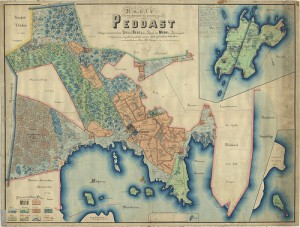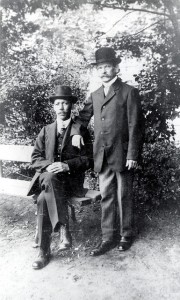History
Earliest records
 The earliest written history of Pädaste Manor dates back to 1566. On the 25th of June of that year Fredrik II, King of Denmark handed the manor over to the von Knorr family in recognition of services rendered to the Danish Crown. The manor and surrounding farms were an important centre of agricultural activity already by that time. It must have been much earlier, not long after bishop Albert von Buxhoeveden by decree of Pope Honorius III led the last and decisive battle on Muhu Island against the Estonian heathens that this enchanting site was selected to build a manor.
The earliest written history of Pädaste Manor dates back to 1566. On the 25th of June of that year Fredrik II, King of Denmark handed the manor over to the von Knorr family in recognition of services rendered to the Danish Crown. The manor and surrounding farms were an important centre of agricultural activity already by that time. It must have been much earlier, not long after bishop Albert von Buxhoeveden by decree of Pope Honorius III led the last and decisive battle on Muhu Island against the Estonian heathens that this enchanting site was selected to build a manor.
Origin
The origins of the manor go back to the 14th century, some of these ancient walls are still visible at the very heart of the house. In the latter part of the 19th century the house was enlarged considerably and given a new façade, hence the harmonious dimensions and clean lines which give the house it’s character today. The buildings that frame the court yard were erected between 1870 and 1890, a period in which the German-Baltic nobles enjoyed great wealth.
The last baron
 In the late 19th century Baron Axel von Buxhoeveden had, as the Imperial Hunting Master an influential position at the court of Czar Nicholas II. Together with his wife Charlotte, heiress to the Siemens company, he brought a touch of worldly splendour to the sleepy Muhu Island. Von Buxhoeveden renovated his manors in Kuivastu and Pädaste. The summers at Pädaste became cultural delights as Charlotte brought artists and musicians in her company when she moved with her entourage from St. Petersburg to Muhu for the summer. Alexander took a special interest in landscaping, one might call him an arborist; whenever he traveled abroad he would bring back rare species, they until today make up the beautiful variety at the park of Pädaste Manor. After his election to Landmarschall of the region he renovated Kuressaare castle and turned it into the seat of government again. In the winter of 1919 Axel von Buxhoeveden was brutally assassinated by revolutionaries while on his way from Pädaste Manor to the mainland. Charlotte von Siemens fled to Brandenburg the next day. Seven hundred years of family presence on Muhu that had started with their forefather Albert von Buxhoeveden’s conquest of the Island in 1227 came to an abrupt end.
In the late 19th century Baron Axel von Buxhoeveden had, as the Imperial Hunting Master an influential position at the court of Czar Nicholas II. Together with his wife Charlotte, heiress to the Siemens company, he brought a touch of worldly splendour to the sleepy Muhu Island. Von Buxhoeveden renovated his manors in Kuivastu and Pädaste. The summers at Pädaste became cultural delights as Charlotte brought artists and musicians in her company when she moved with her entourage from St. Petersburg to Muhu for the summer. Alexander took a special interest in landscaping, one might call him an arborist; whenever he traveled abroad he would bring back rare species, they until today make up the beautiful variety at the park of Pädaste Manor. After his election to Landmarschall of the region he renovated Kuressaare castle and turned it into the seat of government again. In the winter of 1919 Axel von Buxhoeveden was brutally assassinated by revolutionaries while on his way from Pädaste Manor to the mainland. Charlotte von Siemens fled to Brandenburg the next day. Seven hundred years of family presence on Muhu that had started with their forefather Albert von Buxhoeveden’s conquest of the Island in 1227 came to an abrupt end.
Recent history
After years of neglect during the Soviet period in which the use of the manor alternated between army headquarter, fish distribution center and home for the elderly until its abandonment in the early 80’s, we took up the endeavor in 1996 to restore Pädaste Manor to new splendour, with the goal to create one of the finest hotels in the Baltic countryside.






